Meeting Cancelled Due to Unavailability Letter Template
[Your Name]
[Your Title/Position]
[Your Company/Organization]
[Your Address]
[City, State, Zip Code]
[Date]
[Recipient's Name]
[Recipient's Title/Position]
[Recipient's Company/Organization]
[Recipient's Address]
[City, State, Zip Code]
Dear [Recipient's Name],
I hope this letter finds you well. I am writing to inform you that, unfortunately, we must cancel the upcoming meeting scheduled for [meeting date and time]. I sincerely apologize for any inconvenience this may cause.
The reason for the cancellation is the unavailability of some essential participants, whose presence is crucial for making the meeting productive and meaningful. Despite our best efforts to arrange a suitable time for all attendees, unforeseen circumstances have arisen that prevent key individuals from being able to attend.
We understand the importance of the matters that were to be discussed during the meeting and assure you that we will take necessary measures to reschedule it at the earliest convenient date for all participants. Rest assured that your time and commitment are highly valued, and we are committed to ensuring that all relevant parties can contribute to the discussion.
Once we have confirmed a new meeting date and time, we will promptly send out updated invitations to all attendees, along with the agenda and any supporting materials. We ask for your understanding and cooperation during this process, as we work diligently to organize a productive and successful meeting.
If you have any urgent matters that require immediate attention or any specific concerns related to the cancellation, please do not hesitate to reach out to me directly at [Your Phone Number] or [Your Email Address]. I will be more than happy to assist you in any way possible.
Again, I apologize for any inconvenience this cancellation may cause and appreciate your understanding. Thank you for your cooperation and continued support.
Sincerely,
[Your Name]
[Your Title/Position]
[Your Company/Organization]
[Your Email Address]
[Your Phone Number]
Professional Meeting Cancellation Letter Due to Unavailability
Subject: Meeting Cancellation – [Date/Time]
Dear [Recipient Name],
I regret to inform you that I will be unavailable for our scheduled meeting on [Date] at [Time]. Due to unforeseen circumstances, I must cancel this meeting.
I sincerely apologize for any inconvenience caused and hope we can reschedule at a mutually convenient time. Please let me know your availability for a new meeting date.
Thank you for your understanding.
Best regards,
[Your Name]
[Designation]
[Organization Name]
Casual Email for Meeting Cancellation
Subject: Unable to Attend Meeting
Hi [Recipient Name],
I wanted to let you know that I won’t be able to attend our meeting scheduled for [Date/Time] due to [Reason, e.g., prior commitment]. I apologize for any inconvenience.
Could we please find another time that works for both of us?
Thanks,
[Your Name]
Formal Meeting Cancellation Letter With Apology
Subject: Apologies – Meeting Cancellation
Dear [Recipient Name],
I am writing to formally inform you that I will be unable to attend the meeting scheduled for [Date] at [Time] due to [Reason, e.g., urgent work commitment].
I apologize for any inconvenience this may cause and appreciate your understanding. Kindly advise a suitable date to reschedule the meeting.
Thank you.
Sincerely,
[Your Name]
[Designation]
[Organization Name]
Quick Message for Meeting Cancellation
Subject: Meeting Cancelled
Dear [Recipient Name],
I will not be able to attend the meeting on [Date/Time]. Apologies for the inconvenience.
Please suggest a new time that works for you.
Regards,
[Your Name]
Heartfelt Meeting Cancellation Letter
Subject: Regretfully Cancelling Meeting
Dear [Recipient Name],
I am very sorry to inform you that I must cancel our scheduled meeting on [Date] due to unavoidable circumstances. I was looking forward to our discussion.
I hope we can arrange another meeting soon and I truly appreciate your understanding.
Warm regards,
[Your Name]
Provisional Meeting Cancellation Email
Subject: Meeting Tentatively Cancelled
Dear [Recipient Name],
Due to potential unavailability on [Date], I am provisionally cancelling our upcoming meeting. I will confirm once I have clarity on my schedule.
Thank you for your patience and understanding.
Best,
[Your Name]
What is a Meeting Cancelled Due to Unavailability Letter and Why You Might Use It
A meeting cancellation letter is a communication sent to inform participants that a scheduled meeting cannot take place due to the sender's unavailability. Purpose:
- Notify attendees in a timely manner
- Apologize for any inconvenience caused
- Maintain professionalism and courteous communication
- Suggest rescheduling options if necessary
Who Should Send a Meeting Cancellation Letter
- Meeting organizers or hosts
- Team leads or managers cancelling internal meetings
- Professionals cancelling client or external meetings
- Individuals unable to attend important scheduled meetings
Whom Should Receive a Meeting Cancellation Letter
- All participants originally invited to the meeting
- Supervisors, stakeholders, or clients affected by the cancellation
- Administrative staff managing scheduling or meeting rooms
When Should You Send a Meeting Cancellation Letter
- As soon as you know you are unavailable
- If unexpected emergencies arise before a scheduled meeting
- Prior to the meeting to allow participants to adjust their schedules
- When rescheduling is anticipated or necessary
How to Write and Send a Meeting Cancellation Letter
- Start with a clear subject line indicating the meeting cancellation
- Politely address the recipient(s)
- State the reason for cancellation briefly
- Apologize for inconvenience and show consideration
- Suggest rescheduling if appropriate
- Close professionally
- Send via email for digital meetings or printed letter for formal occasions
Formatting Guidelines for Meeting Cancellation Letters
- Length: Keep it concise, 2–4 paragraphs
- Tone: Professional, polite, or casual depending on context
- Wording: Clear and direct, avoid unnecessary details
- Style: Formal letters for official meetings, casual emails for informal meetings
- Mode of sending: Email is preferred for efficiency, letters for formal or high-level meetings
Requirements and Prerequisites Before Sending
- Confirm unavailability and reason for cancellation
- Verify attendee list and affected parties
- Check calendar to suggest potential rescheduling dates
- Prepare any documents if rescheduling involves sharing updated information
After Sending a Meeting Cancellation Letter
- Confirm that recipients received the notification
- Monitor responses for rescheduling or follow-up
- Update internal calendars or scheduling systems
- Communicate new meeting dates once available
Common Mistakes to Avoid When Cancelling a Meeting
- Not sending the cancellation in time
- Providing unclear or vague reasons
- Failing to apologize or acknowledge inconvenience
- Neglecting to suggest alternative meeting times
- Overloading the message with unnecessary details
Elements and Structure of a Meeting Cancellation Letter
- Subject line: Indicate cancellation clearly (e.g., "Meeting Cancelled – [Date]")
- Greeting: Address attendees politely
- Introduction: State the purpose of the message immediately
- Body: Explain unavailability and apologize for inconvenience
- Optional: Suggest rescheduling or next steps
- Closing: Polite sign-off (Regards, Sincerely)
- Signature: Name, designation, and organization if applicable
Tricks and Tips for Effective Meeting Cancellation
- Send the cancellation as early as possible
- Keep tone polite and professional even if casual context
- Use bullet points if explaining rescheduling options
- Personalize message for key participants to maintain relationships
- Confirm receipt to avoid misunderstandings
Compare and Contrast Meeting Cancellation Letters with Similar Communications
- Cancellation vs Postponement:
- Cancellation indicates the meeting will not occur as scheduled; rescheduling may or may not happen immediately.
- Postponement explicitly sets a new date and keeps the meeting active.
- Email vs Letter:
- Email: Quick and efficient, suitable for digital or informal settings.
- Printed letter: Formal, ideal for official meetings with external stakeholders or high-level management.
FAQ About Meeting Cancellation Letters Due to Unavailability
-
Q: How soon should I notify attendees?
A: Immediately after confirming your unavailability to give participants time to adjust. -
Q: Should I provide a reason?
A: Yes, a brief reason is courteous, but avoid excessive personal details. -
Q: Is it necessary to suggest a new date?
A: Recommended if the meeting needs to be rescheduled, optional if cancellation is final. -
Q: Can I cancel a meeting last minute?
A: Only in emergencies; always apologize and acknowledge inconvenience. -
Q: Should I follow up after sending the cancellation?
A: Yes, confirm receipt and communicate rescheduling plans if applicable.

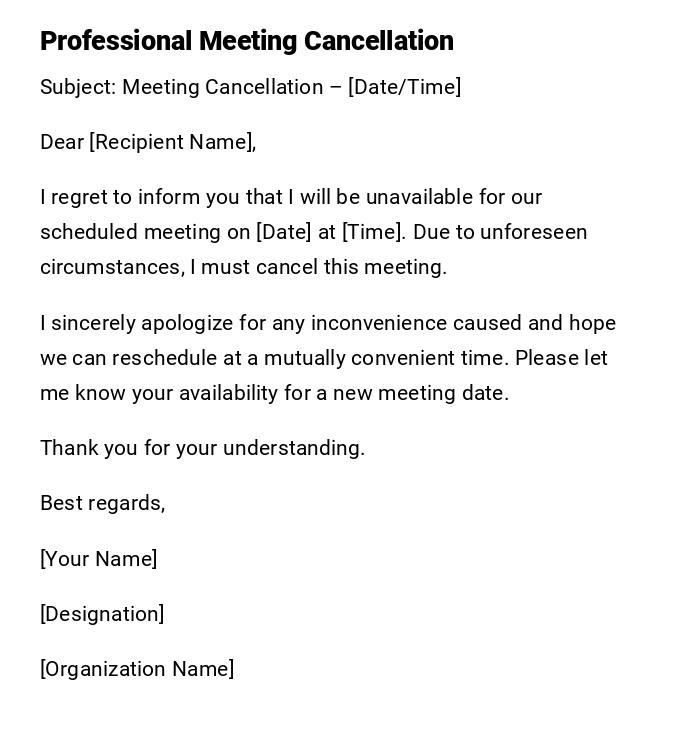
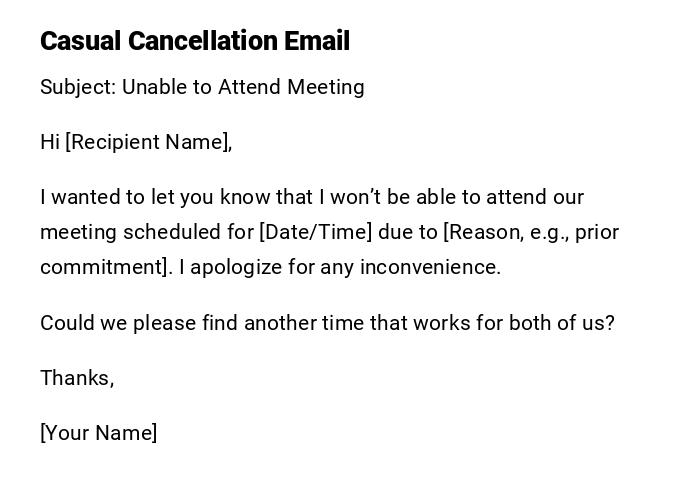
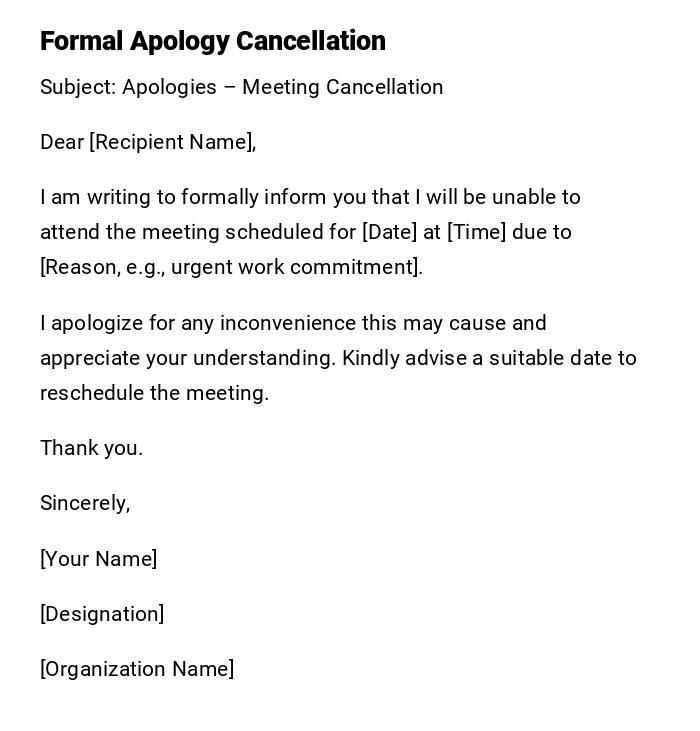
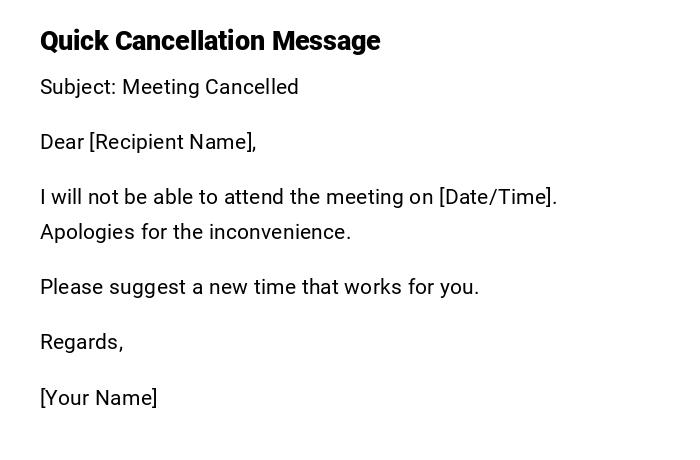
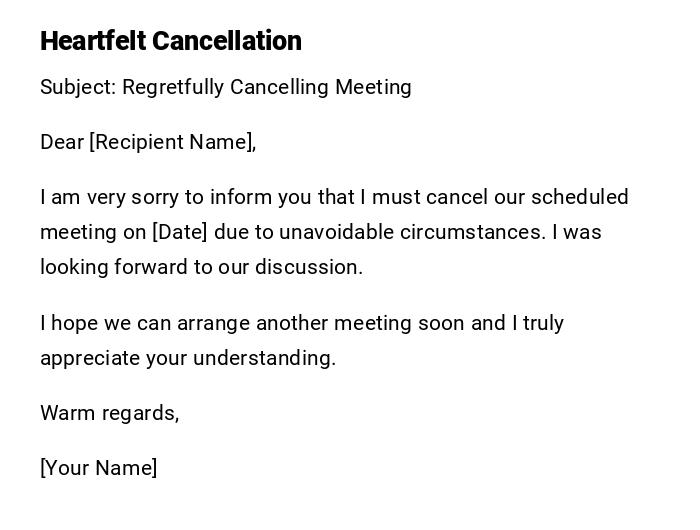
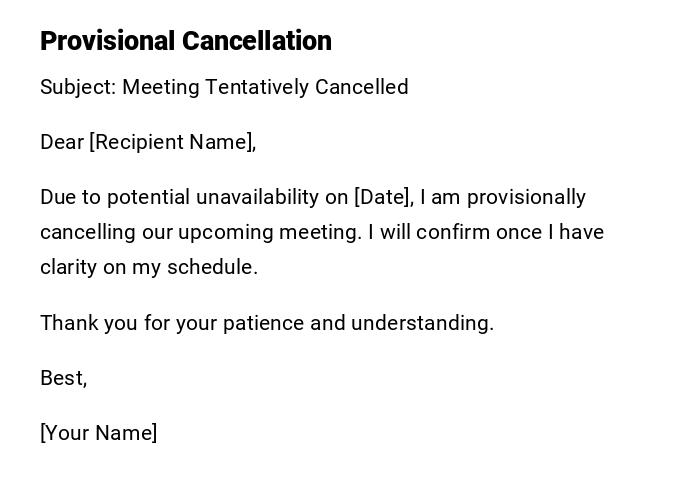

 Download Word Doc
Download Word Doc
 Download PDF
Download PDF